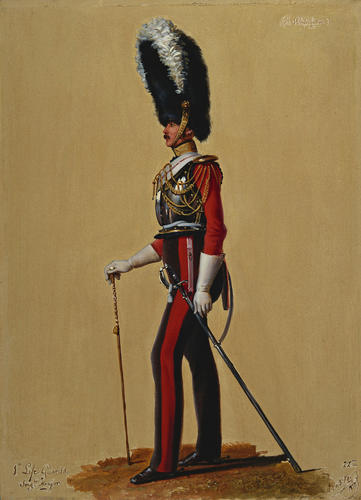-
1 of 253523 objects
Regimental Corporal-Major John, or Corporal Robert, Winterbottom, 1st Life Guards Signed and dated 1832
Oil on card | 35.0 x 25.3 x 0.2 cm (support, canvas/panel/stretcher external) | RCIN 407037

Alexandre-Jean Dubois Drahonet (1791-1834)
Regimental Corporal-Major John, or Corporal Robert, Winterbottom, 1st Life Guards Signed and dated 1832
-
In 1832 French portraitist Alexandre-Jean Dubois Drahonet was commissioned by William IV to paint one hundred pictures illustrating the uniform of the British Army. The Royal Collection retains most of this series. A photograph of the Equerry’s Room at Windsor Castle taken in around 1900 shows some of these paintings hanging together, framed in groups.
During the period of peace following the Napoleonic Wars, increasingly elaborate (and often quite impractical) military attire was devised, particularly by George IV. By the time William IV came to the throne in 1830, uniforms had become too expensive and were simplified and adapted once again. The result of these changes was codified and promulgated in the 1831 Dress Regulations. These paintings were intended to provide a visual record of the recent changes to military dress. Their value is not only historical, however, but also aesthetic: Drahonet produces lively, slightly elongated figures, capturing their facial expressions and setting them in a variety of organic poses.
Each painting in the series depicts a single figure against a neutral background. Although their uniform and accoutrements are the focus, the sitters are often identified by name, as well as regiment and rank. Seen here, in profile, is a member of the 1st Life Guards, part of the Household Cavalry. Although the inscription identifies him as the Sergeant Major John Winterbottom, the type of aiguillette (shoulder ornament) denotes the rank of Corporal, and the sitter might actually be Corporal Robert Winterbottom.The uniform illustrated here consists of a cuirass and white gauntlet cuffs, worn over a red coatee. As a Corporal, Winterbottom holds both a sword and a cane. The tall black bearskin, with a white feather designating this regiment, was increasingly worn instead of the helmet during ceremonial occasions. The following year a motion was passed to limit the bearskin height to 14 inches (36cm). The dark blue trousers he wears (which appear almost black in the painting) with a double scarlet stripe became an authorised part of the Life Guards’ uniform the following year.
Provenance
Commissioned by William IV; recorded in the Equerries Room at Windsor Castle in 1878
-
Creator(s)
-
Medium and techniques
Oil on card
Measurements
35.0 x 25.3 x 0.2 cm (support, canvas/panel/stretcher external)
Category
Object type(s)
Other number(s)
JSS 12